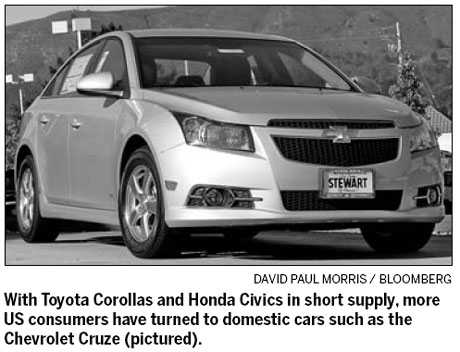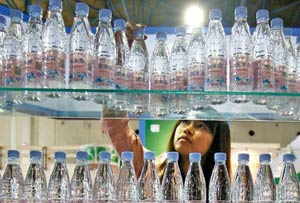Weak dollar increases price of imported autos in US
Updated: 2011-10-20 07:53
(China Daily)
|
|||||||||

SOUTHFIELD, Michigan - Foreign cars are selling in the United States at the biggest price premium to domestic autos in almost 12 years as a weak dollar curtails imports of lower-priced models, allowing General Motors Co and Ford Motor Co to gain share.
The average selling price for a new imported car climbed to a record high of $31,536 in August, according to the US Bureau of Economic Analysis. That was $7,614 more than the average domestic-made car, the biggest gap since December 1999. With Toyota Corollas and Honda Civics in short supply, more consumers have turned to Chevrolet Cruze and Ford Fiesta cars.
The weak dollar discourages automakers such as Toyota Motor Corp and Honda Motor Co from importing lower-priced cars, which have slimmer profit margins. While Japan's March tsunami disrupted auto exports, continued deliveries of premium-brand cars such as Volkswagen AG's Audi boosted luxury autos to a higher proportion of imported-car sales, said Paul Ballew, chief economist for Nationwide Mutual Insurance Co.
"It's very hard to import, especially from Asia, small cars right now because of where the dollar is," he said in a telephone interview. "If you look at luxury-car sales the last few months, they're up double-digits from a year ago while small cars are down more than 20 percent."
GM has gained a percentage point of US market share, rising to 20 percent through September, while Ford's share increased 0.1 point to 16.7 percent.
The surging yen may deter Japanese automakers from using aggressive discounts late this year to try to reclaim US market share. IHS is "not expecting more than usual year-end clearance promotions, along with perhaps some marketing activity" from Toyota and Honda, said Chris Hopson, a Lexington, Massachusetts-based analyst at IHS Automotive.
Industrywide average spending on incentives fell 9.6 percent through September to $2,498 for each vehicle, and discount offers in September fell 3.5 percent from a year earlier to $2,653 on average, according to Autodata Corp.
According to Himanshu Patel, an analyst at JPMorgan Chase & Co, while models made in Japan are now more available than in August, incentives are "clearly not" surging, probably because of the strong yen relative to the dollar.
Bloomberg News









